Welcome to CrowdSource, your weekly guided tour of the latest intellectual disputes, ideological disagreements and national debates that piqued our interest (or inflamed our passions). This week: lawyers debate the Kilmar Abrego Garcia case.
Join us! CrowdSource features the best comments from The Crowd — our cherished readers and subscribers who, with their comments and emails, help make Wisdom of Crowds what it is.
Yet law-abiding scholars write: Law is neither wrong nor right, Law is only crimes Punished by places and by times
— W. H. Auden, “Law Like Love”
Right-Wing Lawyers Differ
The ongoing case of Kilmar Abrego Garcia, a Salvadoran national deported to a Salvadoran prison due to an “administrative error,” has sparked debate among influential right-wing legal scholars.
Standoff? The Supreme Court has said that the Executive needs to “facilitate” Abrego Garcia’s return to the United States — and the White House is refuses to do so.
The case hinges on a 2019 court order stating that, while he may be deported, Abrego Garcia may not be deported back to El Salvador, because that would put his life in danger: “The evidence presented in immigration court included extortion of Abrego Garcia’s family in El Salvador by a gang, including threats to kill Abrego Garcia.”
SCOTUS Hasn’t Asked For Much. Yale Law professor (and The Free Press legal correspondent) Jed Rubenfeld argues that the White House is not legally obligated to “effectuate” the return Abrego Garcia to the United States. “Facilitate means to make something easier. … Effectuate means to make something happen.” The Supreme Court used the word “facilitate.”
The US Technically Still Has Custody of Abrego Garcia. Lawyer (and National Review legal correspondent) Andrew C. McCarthy argues that the White House is complicating an actually straightforward case: “Under the known terms of the US-El Salvador agreement, there appears to be no reason, other than its own stubbornness, that the Trump administration cannot obtain Abrego Garcia’s immediate transfer from the Salvadoran prison (where he remains constructively in US custody) …”
US Citizens Might Be Vulnerable, Too. According Harvard Law professor (and Bush II-era White House counsel) Jack Goldsmith, Abrego Garcia “was taken out unlawfully and a US citizen would have been taken out unlawfully. And that should be enough to trigger the return. But the government hasn’t spoken about citizens, but nothing in their argument distinguishes citizens from noncitizens, as best I can tell.”
Due Process Is Important. Probably prompted by the Abrego Garcia case (and possibly other deportations as well), the Princeton professor Robert P. George posted:
“Transitional Justice.” Harvard law professor Adrian Vermeule responded to George:
George and Vermeule are both leading Catholic conservative intellectuals.
George, a Bush II appointee, comes from the New Natural Law school of jurisprudence, and is closer to the “originalism” of the Federalist Society.
Vermeule made his mark as a “post-liberal” thinker, and formulated an alternative conservative legal approach called “Common Law Constitutionalism.”
“Undoing Past Illegality”
Vermeule alludes to a legal concept called “transitional justice.” What is it?
Transitional justice is “a field of practice on how to deal with past human rights abuses in societies in transition,” as law professor Christine Bell puts it. “ … Human rights law requires accountability in transitions, rooted in the discipline of law.”
Origins. Ruti Teitel tracks the origin of transitional justice to the immediate postwar period (e.g., the Nuremberg Trials) and the post-Cold War democratic transitions in the Global South. Lawyer Sam Ferguson argues that the 1985 “Trial of the Juntas” — which tried members of the Argentine military dictatorship for human rights abuses — gave birth to the field of transitional justice.
“Transitional Justice as Ordinary Justice.” In a 2003 academic article (co-written with University of Chicago law professor Eric A. Posner), Vermeule writes that “political transitions lie on a continuum, of which regime transitions are merely an endpoint,” adding that there’s a “wide variety of transitions that occur in consolidated democracies ...”
What Does Transitional Justice Entail? According to Vermeule and Posner: “measures typically include trials and other processes designed to punish or remove officials and collaborators of the old regime, and transfers of property or money to the victims of the old regime through restitution or reparations.”
What type of “transition” might Trump’s administration be bringing about?
Which “past illegality” might require transitional justice?
Illegal Border Crossings. Vermeule might be alluding to the estimated 6.7 undocumented migrants who entered the US during the Biden Administration.
Perjury. Another possibility: Matthew Mehan, Associate Dean of Hillsdale Graduate School, believes perjury should be a top priority: “Trump and Bondi should especially focus on perjury crimes, for if sworn testimony cannot be trusted, our entire system collapses.”
Vance Enters the Fray
Vice President Vance is a lawyer, too. Last week, he debated several journalists about the Abrego Garcia case.
Mistakes Will Be Made. Here Vance debates Zaid Jilani:
(He Can’t Get No) Satisfaction. Here’s Vance listing complaints against liberal and left-wing critics of the White House’s deportation policies (i.e., “these people”). Below that is an important (and, as of this writing, unanswered), follow-up question from Ross Douthat:
From the Crowd
Trump’s Instincts. RC responds to last week’s livestream about Trump’s “Madness”:
One dynamic that you did not cover in detail, I thought, is Trump’s confidence in his instincts. Several times he has been advised to be more pragmatic, but again and again he has been proven right (Access Hollywood tape, picking JD as VP pick and so on), and that explains why the bureaucrats around him are “incompetent.” In a normal dictatorship, say like Putin, system that ensures everyone in the government prioritizes his rule over everything else, but Putin will still allow experts to run the government. In Trump’s case, it looks like he not content with just power. He also seem to think he is uniquely capable of rolling out a detailed policy, which is why we saw the rollout of tariffs that we saw. A good next step for him would be to make a public statement that he has accomplished his personal goal, and going forward Scott Bressent will manage all trade negotiations and the rollout.
Trump’s other saving grace might be his ability to adapt and pivot when things don’t work out as intended. It’ll be interesting to see what he does now.
Good Reasons? M.L.D. responds to the same livestream:
Shadi Hamid, why are you spending all stream insisting that people have reasons for the things they do? Like, yes, of course, we know. There’s no need to defend Oren, Bin Laden, and Putin from accusations that they are literally insane.
How about some of your own thoughts on whether those reasons they say they have are any good, or whether the consequences suggest that those reasons were well-founded?
How about some concrete examples that illustrate why having a reliable hegemon is bad, actually, because it breeds complacency?
See you next week!
Wisdom of Crowds is a platform challenging premises and understanding first principles on politics and culture. Join us!




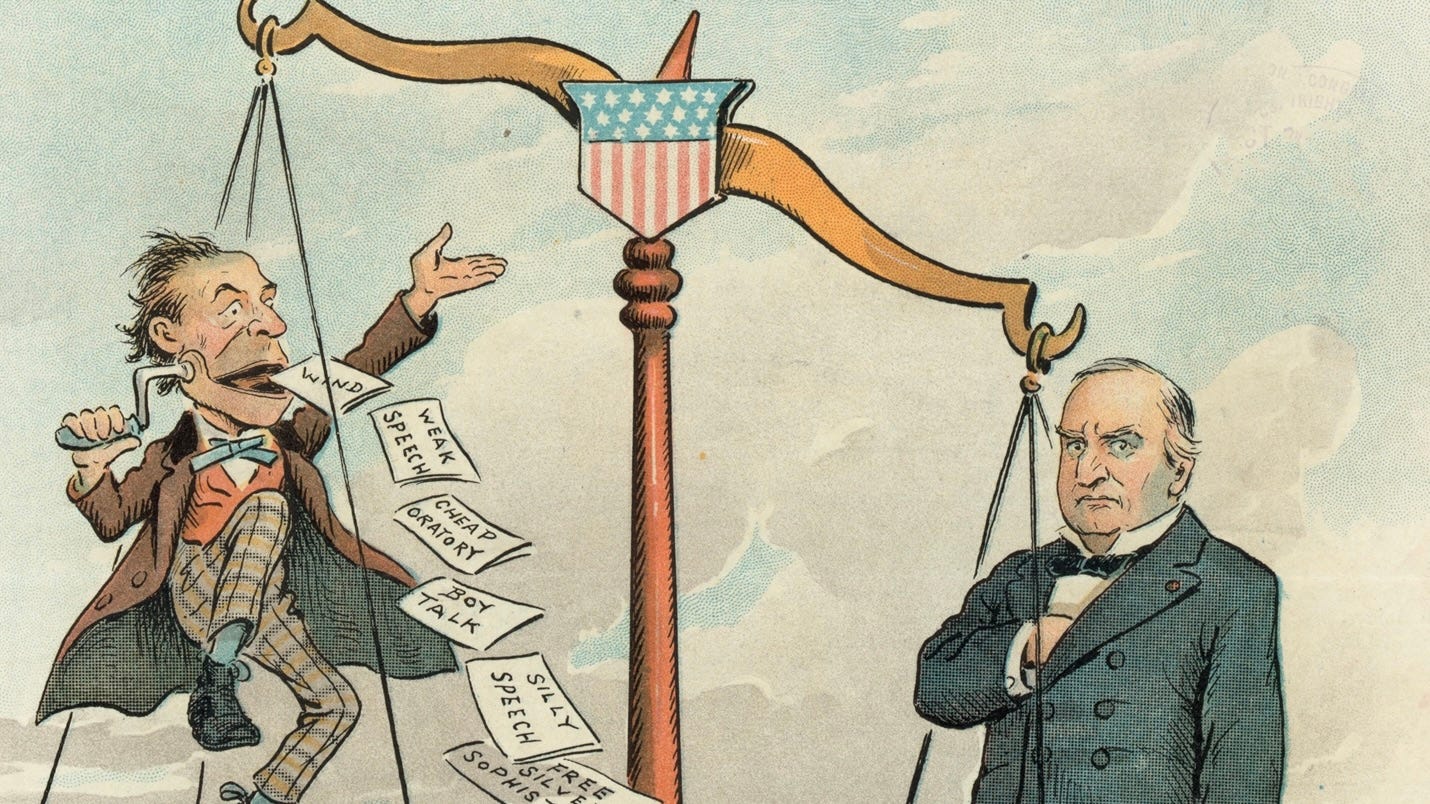
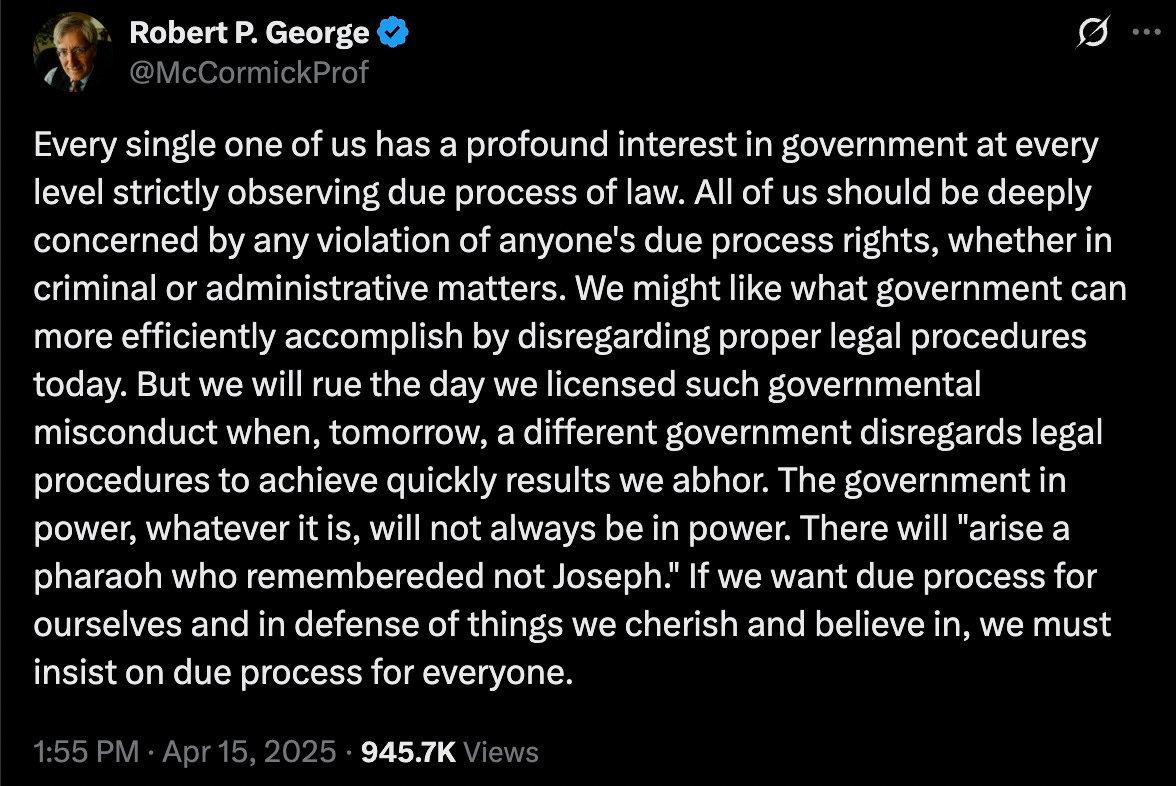
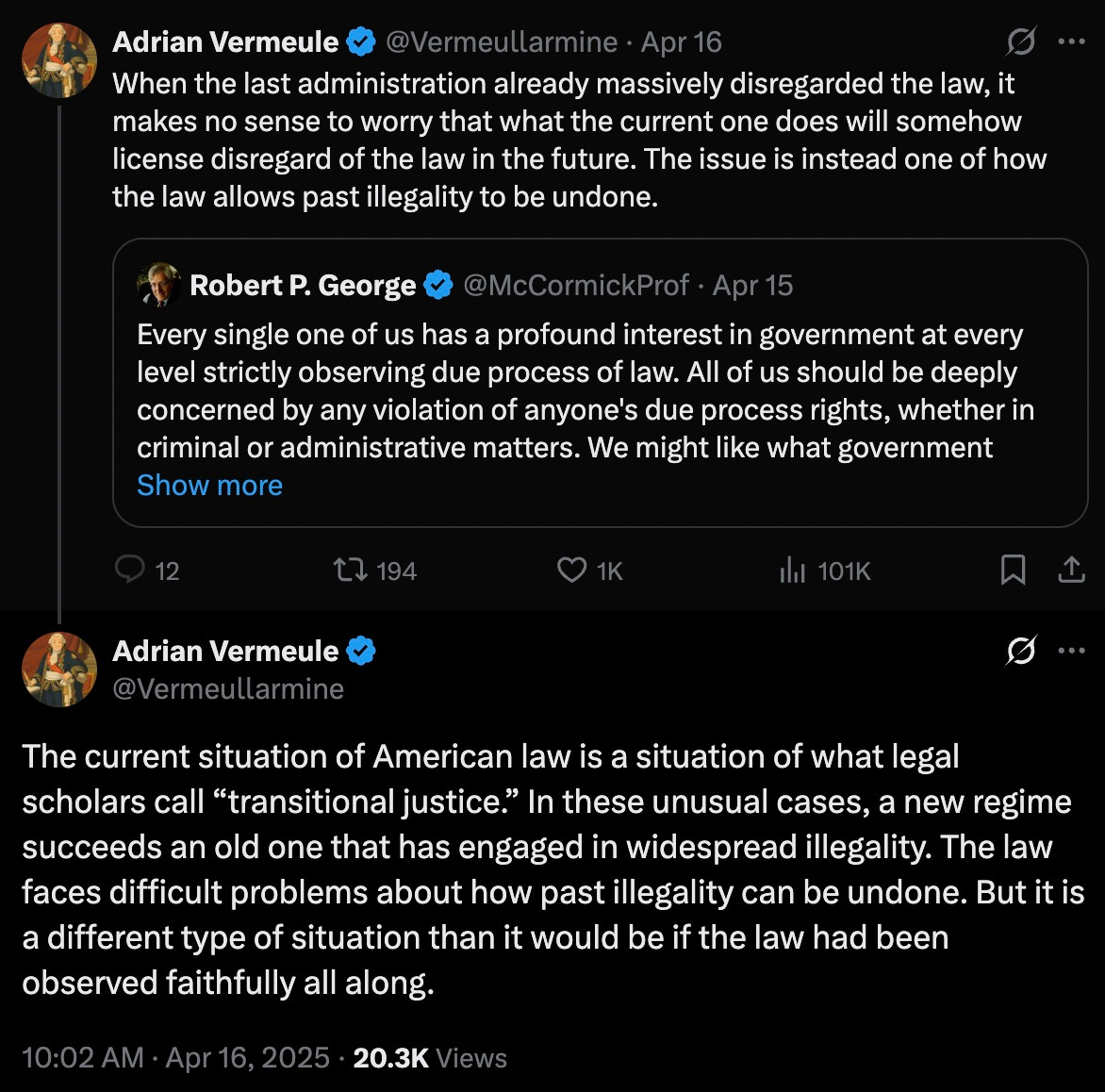
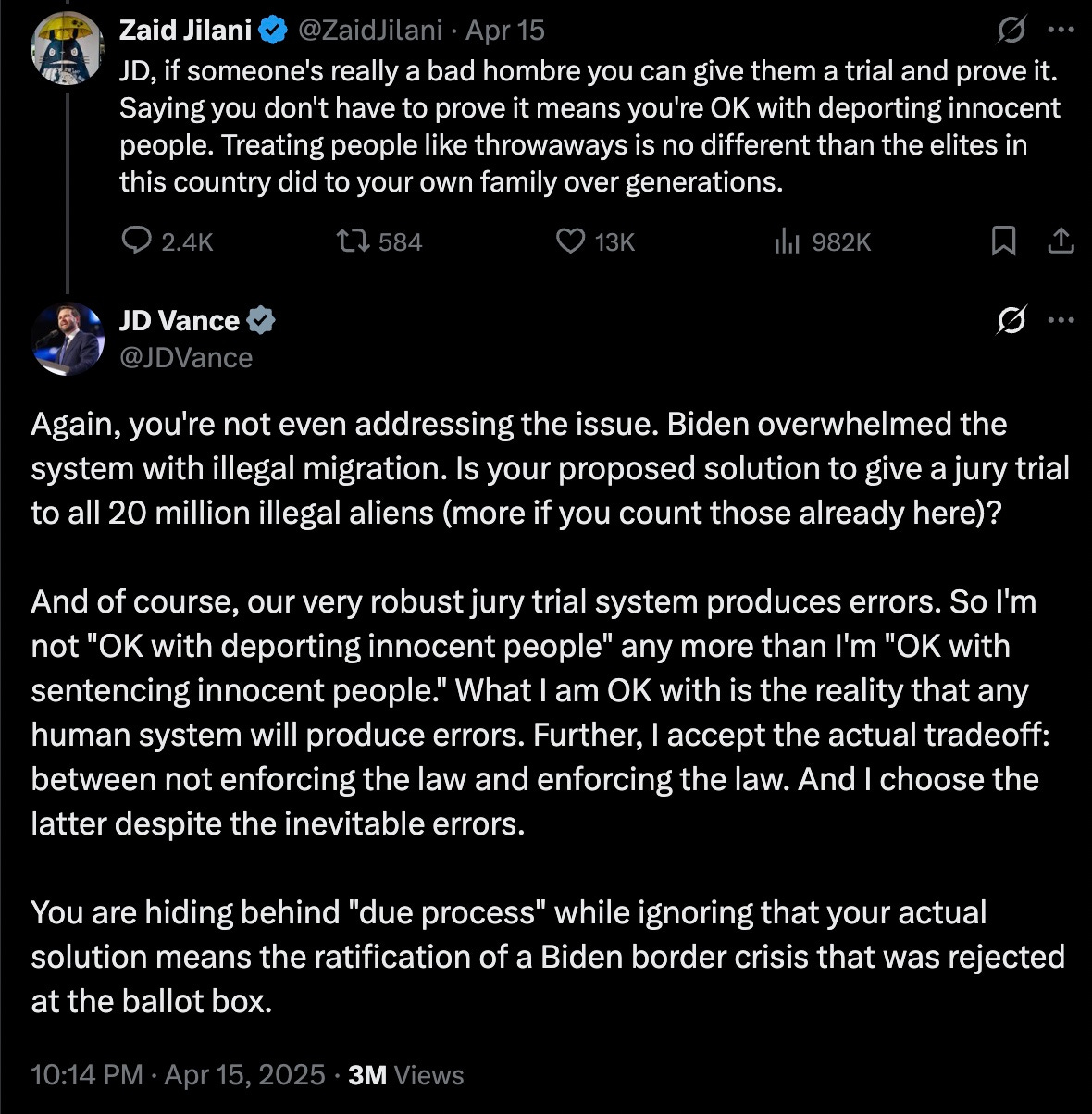
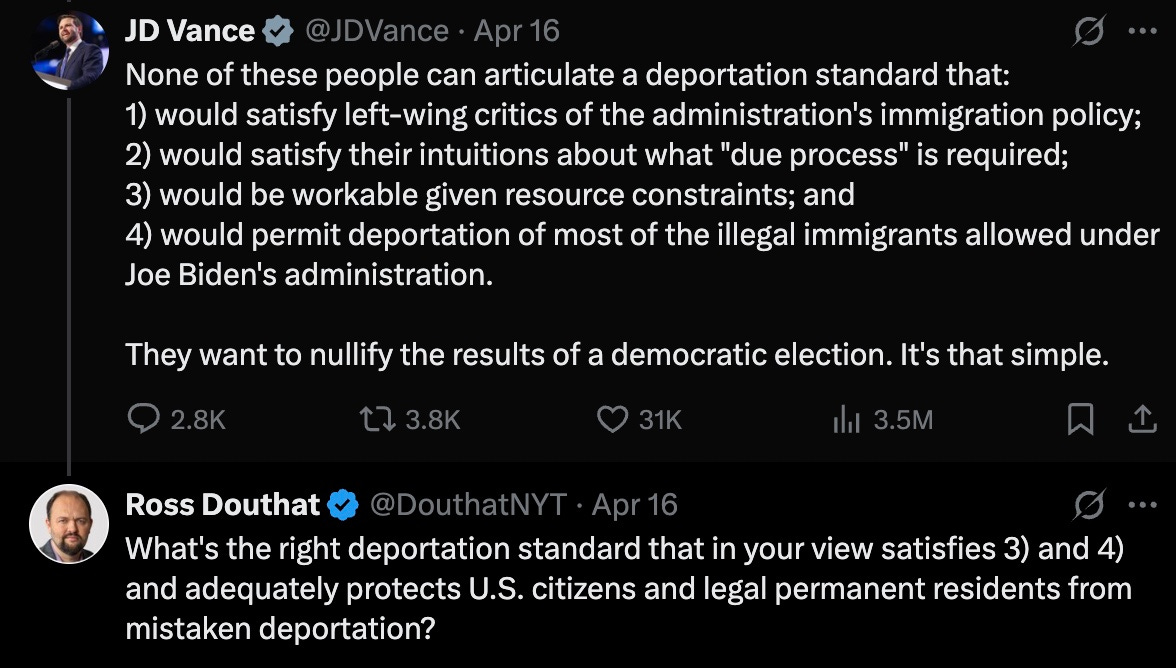
Great, fair summary. Thx
Any discussion of Republican immigration policy ought to include acnowledgment of the factual unreliability of Republican claims about this (and every other) subject, and especially Republican claims about the Biden (or any Democratic) administration. You cite the Heritage Foundation's claim pf 6.7 illegal aliens admitted during the Biden and J.D. Vance's claim that 20 million were admitted -- a claim that appears to have as much grounding in reality as his claim that Haitian immigrants were eating their neighbors' cats and dogs. Here is a nonpartisan assessment: https://www.factcheck.org/2024/02/breaking-down-the-immigration-figures/.